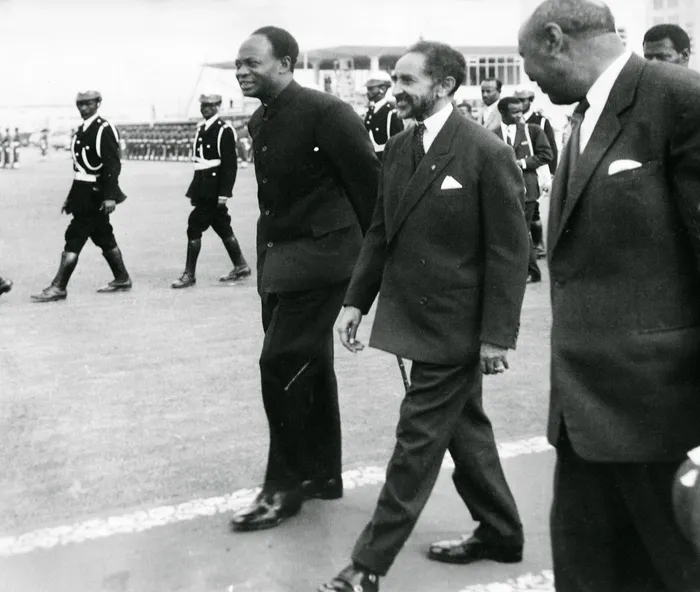Little to celebrate as conflicts overshadow continental progress
AFRICA DAY

Ghana's founder and first President Kwame Nkrumah (left) and Ethiopian Emperor Haile Selassie (centre) at the formation of the Organization of African Unity (OAU) in Addis Ababa, Ethiopia on May 25, 1963. The formation of the OAU is celebrated as Africa Day.
Image: AFP
Dr Sizo Nkala
The occasion of the 62nd anniversary of the birth of the Organization of African Unity (OAU) and the adoption of the OAU Charter in Addis Ababa, Ethiopia, provides an opportunity to reflect and introspect.
Probing how and why Africa has dismally failed to live up to the promises of the OAU Charter six decades after its proclamation is a pertinent undertaking. Africa remains trapped in the neocolonial structures of the global political economy that continue to undermine the continent’s development potential.
The continent is struggling to shake off the colonial legacy of occupying a dependent and very vulnerable position in the global economy. Between 2 and 3 per cent, Africa’s share of the world trade is disappointingly paltry despite its population making up 17 per cent of the global population.
The content and quality of this trade are even more problematic as over 75 per cent of Africa’s exports to the world are primary commodities like oil, coal, chrome, platinum, cocoa, cotton and tobacco to mention a few of which are exported in raw and unprocessed states. The trade model that was imposed on Africa in the colonial era remains intact.
These trade dynamics reflect the failure to move from commodity and agro-based to industrialized and diversified economies. According to the United Nations Conference on Trade and Development (UNCTAD), 83 per cent of African countries are dependent on the extraction and export of commodities.
In Angola, South Sudan, and Nigeria, oil accounts for 95 percent, 92 percent and 80 percent of the export revenues respectively. Botswana, Zambia, and the Democratic Republic of Congo (DRC) minerals make up between 70 and 99 percent of the countries’ export revenues.
Further, more than any other region in the world, the share of the agricultural sector in Africa’s gross domestic product (GDP) stands at 35 per cent and supports the livelihoods of 50 per cent of the population. Even then productivity is still very low with the continent still spending a staggering US$50 billion annually in food imports.
The share of the manufacturing sector in Africa’s GDP decreased from 18 per cent in 2000 to 13 per cent currently – reflecting failed transformation and industrialization efforts. The lack of industrialization, coupled with infrastructure deficiencies, has severely limited the potential of intra-African trade which still stands at a paltry 15 percent.
The unsustainable structure of many African economies has exposed African countries to global commodity price fluctuations which have precipitated a devastating debt crisis with 21 African countries being classified as being at risk of or in debt distress. Many countries now spend more of their revenues on servicing debt than on essential public services such as education, health, and water and sanitation.
It is no wonder that Africa has the embarrassing opprobrium of being the poverty capital of the world with over 400 million of its people living in conditions of extreme poverty. As such, we commemorate the 62nd anniversary of the OAU under conditions of continued economic servitude and exploitation.
Further, 62 years of political independence has done little to end Africa’s marginalization in global governance institutions. The continent still has no permanent seat at the United Nations Security Council (UNSC) and its calls for inclusion in the UN’s most powerful organ have gone unheeded for decades.
Thus, despite being home to over 30 armed conflicts, Africa has a limited say in the body that makes decisions on global security. Africa’s 54 states share a total of 6.5 percent of the voting rights in the International Monetary Fund (IMF) and only 11 percent of voting shares in the World Bank.
This means that African countries exercise limited influence in the decisions of the institutions that determine the direction of the global economic policy. Even in the World Trade Organization (WTO) which formally uses a one country one vote system, decisions are often imposed by big economies at the expense of smaller ones.
Moreover, because of perceptions and actual conditions on the ground in Africa, the continent attracts only 3-5 per cent of foreign direct investment (FDI) which is not nearly enough to stimulate the required levels of economic growth. As such, although Africa is slowly discovering its agency on the international stage, its independence and autonomy remain compromised by its economic weaknesses.
The continent has not fared any better politically. In recent years we have witnessed the erosion of democratic institutions and the increasing frequency of military and constitutional coups. The raging conflicts in Sudan, South Sudan, the DRC, Mozambique and the Central African Republic (CAR) have killed hundreds of thousands and displaced millions with continental institutions like the AU seemingly hapless to do anything.
While the continental body has been 62 years in the making, it is still largely weak and ineffectual in addressing the challenges facing African people. As such, the occasion of the 62nd anniversary of the OAU brings little to celebrate. Africa urgently needs visionary and effective leaders who will confront the challenges facing the continent head-on.
* Dr. Sizo Nkala is a Research Fellow at the University of Johannesburg’s Centre for Africa-China Studies.
** The views expressed do not necessarily reflect the views of IOL, Independent Media or The African.